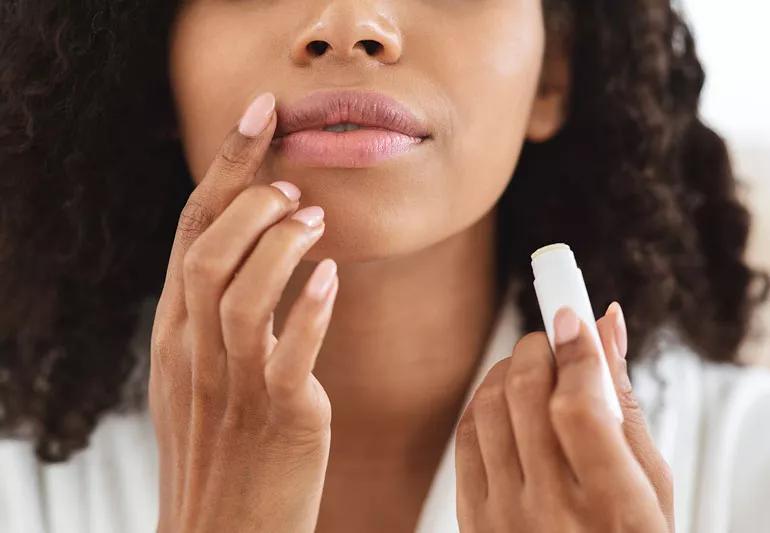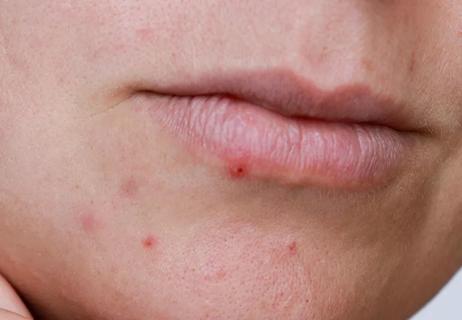Pay attention to the ingredients in your favorite products — and how often you’re using them

We put our lips through a lot. We dehydrate them, crack them, lick them, bite them, peel them and scrub them. It’s little wonder that that delicate skin can get a bit temperamental from time to time.
Advertisement
Cleveland Clinic is a non-profit academic medical center. Advertising on our site helps support our mission. We do not endorse non-Cleveland Clinic products or services. Policy
Most of us were taught to undo the damage with lip balms and chapsticks. But is that the right call? Could the products we’re slathering on our lips actually exacerbate the problem? But even if they’re healthy, how often should we be using them? And is it true that you can get addicted to lip care products?
We turned to dermatologist Melissa Piliang, MD, for answers. She busts a few chapstick myths and helps us understand the role that lip balms should play in our skincare routine.
Lip balm comes in a variety of shapes, sizes and consistencies. Some take the form of waxy sticks, while others present more like salves or ointments. They can be glossy, medicated, tinted, flavored, scented, etc. And their prices are just as variable.
Before we dive into a discussion about lip balms, it’s worth noting that while there’s a brand called ChapStick®, the word “chapstick” is commonly used to describe a wide range of lip care products — sort of like how the brand name Band-Aid® is often used as a synonym for the word “bandage.” This article is about lip care products writ large, not a specific product or brand.
Some people say that applying lip balm causes your body to stop generating natural moisture around your lips. That’s just a myth, Dr. Piliang states. In reality, it’s all about the ingredients in the products you’re using.
Advertisement
“Lip balms containing ingredients like phenol, menthol and salicylic acid actually make your lips drier. So, you apply more and it becomes a vicious cycle,” she explains.
Some of these products also cause a tingling feeling when you apply them. This either causes irritation or removes outer layers of your skin, like an exfoliant. Then, you have less protection, are more susceptible to environmental factors and have to apply more product.
“Just avoid balms containing those ingredients,” Dr. Piliang advises.
But it’s not just phenol, menthol and salicylic acid you need to watch out for. The chemicals in some scents and added flavorings can also irritate your skin or cause allergies. Ditto for artificial color.
“These ingredients dry out the skin and can leave it feeling more chapped, so less is better,” Dr. Piliang adds.
There’s an awful lot of choices out there when it comes to lip care products. So, how can you be sure you’re using a lip balm that will actually keep your lips hydrated and healthy? Dr. Piliang offers two suggestions:
Lip balm may feel soothing on chapped lips. But it can also turn into a bad habit that’s hard to break.
But is it really possible to get addicted to the stuff?
Not in the physiological sense, Dr. Piliang reassures. But — like anything else — chapstick can become a psychological crutch.
“It can definitely be habit-forming,” she says. “Applying lip balm soothes your lips, feels good and can be very comforting. That can lead to an unconscious habit that helps with stress or anxiety — kind of like twirling your hair or biting your nails.”
Dr. Piliang recommends paying attention to how often you use lip balms to see whether you’re doing it out of a real need to protect and moisturize, or for other reasons.
Still not sure? Dr. Piliang offers several common-sense questions you can ask yourself to determine whether you have a psychological dependence on lip balm:
Advertisement
The more questions you answer ‘yes’ to in the list, the more likely it is that you have a dependency on lip balm. But there’s good news: You can cut down your usage without placing your pucker in peril!
Trying to be less reliant on your trusty chapstick, but bothered by dryness? Here are some alternatives to lip balm that can help keep your lips hydrated and happy:
Advertisement
Humans have been preoccupied by their lip shape, size, color and texture for a long time. While standards of beauty have changed over the years, healthy smackers are always in style.
They’re also big business. Which means there are plenty of cosmetic companies, social media influencers and self-appointed experts out there who are eager to tell you how to achieve a perfect pout. Misinformation abounds. And some of it can be scary.
Dr. Piliang offers an example. “There’s a myth that the shine in a lip gloss allows the sun’s rays to penetrate more and increases skin cancer risk. While we do see skin cancer on the lips, nothing in lip balms causes cancer.”
She advises skipping the information overload and going straight to your dermatologist with any questions you have about your kisser. They can help you separate fact from fiction and give you the guidance you need to keep your lips looking luscious for a good long time!
Advertisement

Sign up for our Health Essentials emails for expert guidance on nutrition, fitness, sleep, skin care and more.
Learn more about our editorial process.
Advertisement

Lip balms and ointments, drinking more water and running a humidifier can help eliminate dry lips

Your bottom lip is 12 times more likely than your upper lip to get sunburned

Using salicylic acid or benzoyl peroxide can help clear up breakouts near your lips

Over-the-counter antifungal creams usually get the job done, but it’s important to keep it from spreading in the meantime

Although it could be used as a moisturizer, this new trend is not recommended

The popular skin care ingredient can help smooth, brighten and strengthen your skin

It’s a great disinfectant for around your home, but not for your skin

Even small moments of time outdoors can help reduce stress, boost mood and restore a sense of calm

A correct prescription helps your eyes see clearly — but as natural changes occur, you may need stronger or different eyeglasses

Both are medical emergencies, but they are very distinct events with different causes